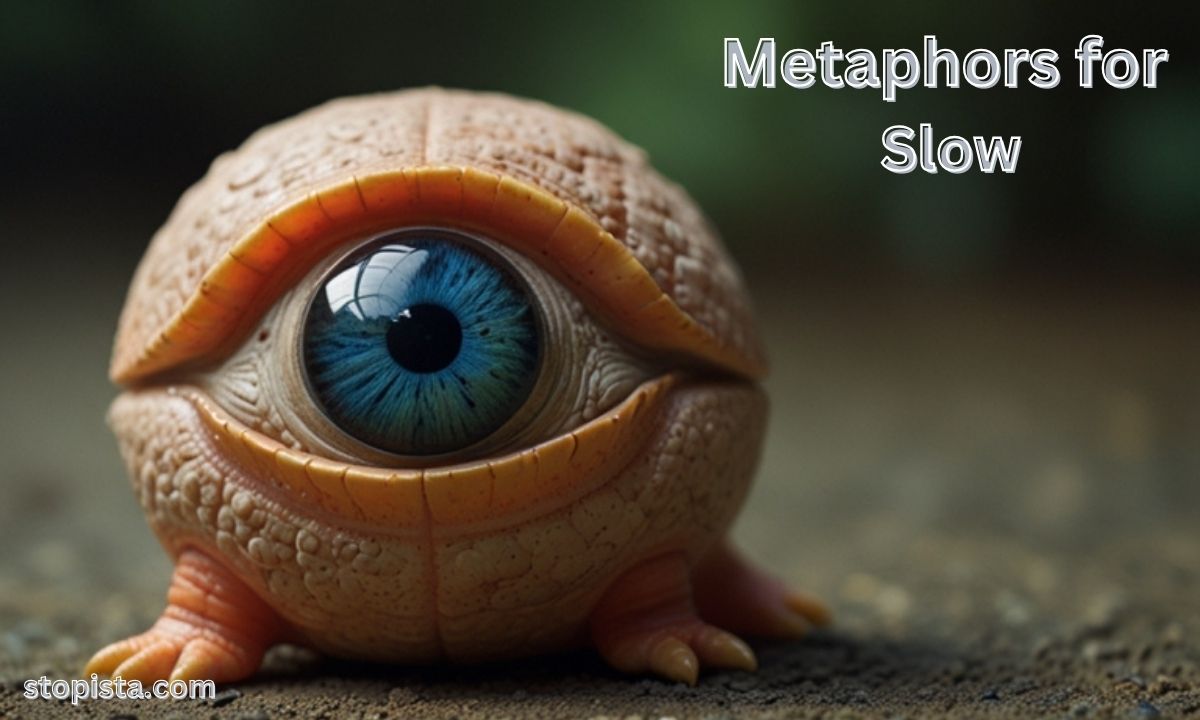When we talk about something moving slowly, it’s often helpful to use metaphors that paint a vivid picture of the pace. Here are 45 metaphors to describe something moving at a leisurely, lazy, or sluggish pace.
Metaphors for Slow
- Meaning: This metaphor highlights an extreme level of slowness, comparing it to the famously slow-moving sloth, especially on a day of rest.
- In a Sentence: “The delivery service was moving like a sloth on a Sunday, and my package still hasn’t arrived.”
- Other Ways to Say: Moving at a snail’s pace, crawling like a tortoise.
2. Molasses in January
- Meaning: This metaphor evokes the image of thick molasses moving slowly, especially during the cold, slow days of January.
- In a Sentence: “The line at the DMV moved like molasses in January—each step felt like an eternity.”
- Other Ways to Say: Moving like cold honey, moving in slow motion.
3. A Turtle Crossing the Road
- Meaning: Like the slow movement of a turtle trying to make its way across a busy road, this metaphor emphasizes deliberate slowness.
- In a Sentence: “Her progress on the project was like a turtle crossing the road—painfully slow but steady.”
- Other Ways to Say: Moving at a glacial pace, creeping along.
4. Snail’s Pace
- Meaning: Snails are infamous for their slow movements, making this a classic metaphor for anything that’s moving very slowly.
- In a Sentence: “The traffic moved at a snail’s pace during the rush hour, and I thought I’d never get home.”
- Other Ways to Say: Crawling along, dragging one’s feet.
5. Like Watching Paint Dry
- Meaning: Often used to describe something that is so slow it feels boring or agonizing.
- In a Sentence: “The meeting felt like watching paint dry—everyone was just waiting for it to be over.”
- Other Ways to Say: As slow as a watched pot, like waiting for grass to grow.
6. A Clock with No Hands
- Meaning: A clock that doesn’t function properly, symbolizing a lack of movement or progress.
- In a Sentence: “The workday dragged on like a clock with no hands, with no end in sight.”
- Other Ways to Say: Time standing still, endlessly ticking.
7. A Glacier’s Drift
- Meaning: Glaciers move at an extremely slow pace, making this a metaphor for something that takes forever.
- In a Sentence: “The process of getting approval for the project felt like a glacier’s drift.”
- Other Ways to Say: Moving like molasses, inching forward.
8. The Last Day of Summer Vacation
- Meaning: The final day of a long vacation always seems to drag on endlessly.
- In a Sentence: “That last hour at work felt like the last day of summer vacation—agonizingly slow.”
- Other Ways to Say: Like a slow-motion replay, dragging on.
9. A Snail in a Marathon
- Meaning: A very slow participant in a long, competitive race, this metaphor focuses on something moving at an impossibly slow pace.
- In a Sentence: “His progress through the project was like a snail in a marathon—he just couldn’t catch up.”
- Other Ways to Say: Struggling to keep up, lagging behind.
10. A Broken Record
- Meaning: Refers to a repeating, monotonous action that feels like it’s dragging on forever, much like a stuck record.
- In a Sentence: “The boss kept repeating the same instructions, and it felt like a broken record—over and over again.”
- Other Ways to Say: A stuck tape, a never-ending loop.
11. A Wind-Up Toy Winding Down
- Meaning: This metaphor compares slow progress to a toy winding down, becoming slower and slower until it stops.
- In a Sentence: “The meeting was like a wind-up toy winding down—slower and slower until no one was paying attention.”
- Other Ways to Say: Slowing to a halt, winding down.
12. A Slumbering Bear
- Meaning: Like a bear in hibernation, this metaphor suggests something that’s sluggish, often taking its time to get moving.
- In a Sentence: “The company’s growth was like a slumbering bear, only waking up after a long winter.”
- Other Ways to Say: Moving in slow motion, dormant.
13. Walking Through Mud
- Meaning: Just as it’s hard to walk quickly through thick mud, this metaphor is for anything that feels heavy or difficult to move forward.
- In a Sentence: “The team was walking through mud trying to finish the project—nothing seemed to go right.”
- Other Ways to Say: Mired in difficulty, trudging along.
14. A Rusty Gear
- Meaning: Gears are supposed to turn smoothly and quickly, but a rusty one moves slowly and ineffectively, making this a good metaphor for sluggishness.
- In a Sentence: “His response time was like a rusty gear—everything took far longer than it should have.”
- Other Ways to Say: Moving inefficiently, stuck in the mud.
15. A Slow-Burning Candle
- Meaning: Like a candle that burns down slowly, this metaphor signifies something that progresses at a deliberate, drawn-out pace.
- In a Sentence: “The negotiation was like a slow-burning candle—each point was drawn out and took forever to resolve.”
- Other Ways to Say: Progressing steadily, burning slowly.
16. A Lazy River
- Meaning: A river that flows gently and slowly without rushing, representing a relaxed or leisurely pace.
- In a Sentence: “The project proceeded like a lazy river, with no sense of urgency or momentum.”
- Other Ways to Say: Drifting along, coasting slowly.
17. A Drowsy Cat
- Meaning: Cats are known for their slow and deliberate movements, especially when they’re not in a rush.
- In a Sentence: “The workday was like a drowsy cat, everything moving in a calm, unhurried rhythm.”
- Other Ways to Say: Moving lazily, taking its time.
18. A Car in Neutral
- Meaning: When a car is in neutral, it can’t move forward without the driver putting it into gear, much like a situation that isn’t progressing.
- In a Sentence: “The project felt like a car in neutral—no one was making any progress.”
- Other Ways to Say: Going nowhere, stuck in place.
19. A Sinking Ship
- Meaning: As a ship sinks slowly into the water, this metaphor implies a situation that is progressively getting slower and less effective.
- In a Sentence: “Their efforts to fix the issue felt like a sinking ship, no matter what they did, progress was minimal.”
- Other Ways to Say: Drifting aimlessly, slowly going under.
20. A Snail in a Shell
- Meaning: A snail retreating into its shell takes its time and avoids moving forward, symbolizing reluctance to progress.
- In a Sentence: “His response to the proposal was like a snail in a shell—he just wouldn’t make a decision.”
- Other Ways to Say: Hiding away, hesitating to move.
21. A Leaf Floating in the Wind
- Meaning: A leaf floating in the wind moves slowly and aimlessly, suggesting a lack of direction or urgency.
- In a Sentence: “The decision-making process was like a leaf floating in the wind—there was no clear direction.”
- Other Ways to Say: Drifting along, meandering slowly.
22. A Worn-Out Shoe
- Meaning: Like a shoe that has been worn down over time, this metaphor emphasizes slowness from age or exhaustion.
- In a Sentence: “The project felt like a worn-out shoe—slow, uncomfortable, and past its prime.”
- Other Ways to Say: Running on empty, barely moving.
23. A Pond Covered in Lily Pads
- Meaning: A pond filled with lily pads moves slowly, as if the water is partially blocked, symbolizing something sluggish and interrupted.
- In a Sentence: “His work habits were like a pond covered in lily pads—everything took longer than it should.”
- Other Ways to Say: Stagnant, encumbered with obstacles.
24. A Tortoise with a Broken Leg
- Meaning: Like a tortoise that’s injured, this metaphor suggests an even slower pace than usual.
- In a Sentence: “The paperwork was like a tortoise with a broken leg—frustratingly slow.”
- Other Ways to Say: Stumbling along, limping forward.
25. A Slow-Pouring Rain
- Meaning: Like rain that falls gently and continuously, this metaphor represents a slow but steady pace.
- In a Sentence: “The day unfolded like a slow-pouring rain, each hour moving without much excitement.”
- Other Ways to Say: Drizzling slowly, trickling along.
26. A Dry Creek Bed
- Meaning: A creek bed without flowing water is stagnant, just as a slow process may feel stuck and unchanging.
- In a Sentence: “The project was like a dry creek bed—stuck, with no signs of progress.”
- Other Ways to Say: Dried up, standing still.
27. A Cold Cup of Coffee
- Meaning: Like coffee that’s lost its warmth, this metaphor implies a situation that’s sluggish or stale.
- In a Sentence: “The conversation was like a cold cup of coffee—hardly moving and losing its flavor.”
- Other Ways to Say: Lukewarm, stale.
28. A Worn-Out Horse
- Meaning: A horse that’s tired from overuse moves slower, much like something that has lost its energy.
- In a Sentence: “The negotiations were like a worn-out horse—dragging and barely moving forward.”
- Other Ways to Say: Out of steam, dragging its feet.
29. A Lonely Road
- Meaning: A long, empty road can symbolize isolation and the slow pace of progress when there’s no rush.
- In a Sentence: “The meeting felt like a lonely road, dragging on with no end in sight.”
- Other Ways to Say: An endless journey, going nowhere.
30. A Melting Ice Cube
- Meaning: As an ice cube slowly melts, this metaphor symbolizes something that’s taking its sweet time to disappear or change.
- In a Sentence: “His interest in the idea was like a melting ice cube—slowly fading away.”
- Other Ways to Say: Eroding away, dissolving bit by bit.
31. Like a Snail in a Shell
- Meaning: Represents something or someone retreating or moving slowly, avoiding progress.
- In a Sentence: “Her response to the feedback was like a snail in a shell—she just couldn’t bring herself to take action.”
- Other Ways to Say: Hesitating, hiding away.
32. A Glacier Melting in Spring
- Meaning: Something that’s slow but inevitable, often taking a long time to show any change.
- In a Sentence: “The team’s decision-making was like a glacier melting in spring—gradual but eventually unavoidable.”
- Other Ways to Say: Slowly progressing, thawing out.
33. Like Wading Through Waist-Deep Water
- Meaning: A situation where progress feels challenging and slow, as if trying to move through thick water.
- In a Sentence: “The research was like wading through waist-deep water—every step felt like an effort.”
- Other Ways to Say: Struggling forward, trudging through.
34. A Sloth on Ice Skates
- Meaning: Describes an awkwardly slow movement, with the added idea of something that’s uncomfortable or difficult to move.
- In a Sentence: “His attempt at completing the project was like a sloth on ice skates—uncoordinated and painfully slow.”
- Other Ways to Say: Stumbling along, barely moving.
35. A Broken Elevator
- Meaning: Something that should be moving smoothly but is stuck or progressing in a very limited manner.
- In a Sentence: “The company’s growth felt like a broken elevator—going nowhere fast.”
- Other Ways to Say: Stalled, stuck in place.
36. A Heavy Cloud in the Sky
- Meaning: Symbolizes something that looms and moves slowly, casting a long shadow over progress.
- In a Sentence: “The project deadline was like a heavy cloud in the sky—dragging on endlessly.”
- Other Ways to Say: Looming overhead, moving slowly like a storm.
37. A Bouncing Ball That Won’t Bounce
- Meaning: Refers to a situation that is expected to gain momentum but instead moves with little or no progress.
- In a Sentence: “His career seemed like a bouncing ball that wouldn’t bounce—always stuck in the same spot.”
- Other Ways to Say: Stagnant, going nowhere.
38. Like Watching Grass Grow
- Meaning: A classic metaphor to describe an agonizingly slow process.
- In a Sentence: “The way they handled the paperwork was like watching grass grow—it seemed like it would never be done.”
- Other Ways to Say: Moving at a glacial pace, crawling.
39. A Pile of Leaves in the Wind
- Meaning: Something scattered and slow-moving, being pushed along with no real force or direction.
- In a Sentence: “The conversation was like a pile of leaves in the wind—drifting and aimless.”
- Other Ways to Say: Drifting along, aimlessly moving.
40. Like a Caterpillar in a Cocoon
- Meaning: A slow-moving transformation process, representing gradual change that takes time.
- In a Sentence: “The change in the company’s culture was like a caterpillar in a cocoon—slow but steady.”
- Other Ways to Say: Evolving slowly, gradually unfolding.
41. A Rusted Train on Old Tracks
- Meaning: A metaphor for something that’s outdated, slow, and no longer functioning as it should.
- In a Sentence: “His outdated technology was like a rusted train on old tracks—slow and inefficient.”
- Other Ways to Say: Outdated, dragging along.
42. Like Watching a Pot of Soup Simmer
- Meaning: Something that takes a lot of time to reach its full potential, moving slowly but steadily.
- In a Sentence: “Her idea for the business was like watching a pot of soup simmer—it needed time to develop.”
- Other Ways to Say: Stewing slowly, taking its time.
43. A Rainstorm that Never Ends
- Meaning: A slow-moving process that feels like it has no end in sight, often frustrating.
- In a Sentence: “The paperwork felt like a rainstorm that never ends, just an endless downpour of forms and signatures.”
- Other Ways to Say: Endless, never-ending.
44. Like Walking in Deep Sand
- Meaning: A situation where every step feels like an effort, with progress seeming difficult and slow.
- In a Sentence: “Her progress on the project was like walking in deep sand—every decision seemed harder than the last.”
- Other Ways to Say: Trudging along, struggling forward.
45. A Worn Path Through the Woods
- Meaning: A path that’s been traveled slowly over time, representing a gradual journey rather than a quick or easy one.
- In a Sentence: “The team’s progress felt like a worn path through the woods—steady, but not fast.”
- Other Ways to Say: Moving at a steady pace, gradually advancing.
MCQ QUIZ: Metaphors for Slow
1. What does the metaphor “Like a Snail in a Shell” represent?
a) Someone rushing to finish a task
b) Someone avoiding progress
c) Someone achieving rapid results
d) Someone working quickly
Answer: b) Someone avoiding progress
2. “A Glacier Melting in Spring” represents progress that is:
a) Rapid and sudden
b) Inevitable but slow
c) Completely stopped
d) Delayed due to external factors
Answer: b) Inevitable but slow
3. What does the metaphor “Like Wading Through Waist-Deep Water” imply?
a) A smooth and easy journey
b) A challenging and slow process
c) A fast-moving situation
d) A situation that progresses with great ease
Answer: b) A challenging and slow process
4. “A Sloth on Ice Skates” describes a situation where:
a) Things are moving quickly and smoothly
b) Progress is awkward and slow
c) There’s no effort to move
d) Everything is moving effortlessly
Answer: b) Progress is awkward and slow
5. The metaphor “A Broken Elevator” represents:
a) A smooth progression with minor obstacles
b) A situation that should be moving but is stuck
c) Rapid development with no hindrances
d) A swift journey towards success
Answer: b) A situation that should be moving but is stuck
6. “A Heavy Cloud in the Sky” suggests:
a) Something progressing quickly
b) Something moving at an unstoppable pace
c) Something slow and looming
d) A sudden and unexpected change
Answer: c) Something slow and looming
7. The metaphor “A Bouncing Ball That Won’t Bounce” is used to describe:
a) A situation gaining momentum
b) A situation stuck or moving with no progress
c) Something progressing at lightning speed
d) A smooth and uninterrupted movement
Answer: b) A situation stuck or moving with no progress
8. What does the metaphor “Like Watching Grass Grow” imply about a situation?
a) The situation is moving rapidly
b) The situation is slow and tedious
c) The situation is moving in a random direction
d) The situation is progressing in an exciting way
Answer: b) The situation is slow and tedious
9. “A Pile of Leaves in the Wind” suggests a situation that is:
a) Moving rapidly with purpose
b) Scattered and aimless
c) Moving toward a clear goal
d) Progressing efficiently
Answer: b) Scattered and aimless
10. What does “Like a Caterpillar in a Cocoon” signify about progress?
a) Fast and sudden change
b) Slow but inevitable transformation
c) Complete stagnation
d) Immediate results
Answer: b) Slow but inevitable transformation
11. “A Rusted Train on Old Tracks” suggests that something is:
a) New and fast-moving
b) Outdated and slow
c) Progressing efficiently
d) Rapidly evolving
Answer: b) Outdated and slow
12. “Like Watching a Pot of Soup Simmer” represents progress that is:
a) Moving quickly and without hesitation
b) Taking its time but developing steadily
c) Stopped and unchanging
d) Fast but unstable
Answer: b) Taking its time but developing steadily
13. “A Rainstorm that Never Ends” represents:
a) A situation that moves very quickly
b) A never-ending, slow-moving situation
c) A rapidly improving situation
d) An easily handled issue
Answer: b) A never-ending, slow-moving situation
14. “Like Walking in Deep Sand” suggests a process that is:
a) Moving easily and quickly
b) Incredibly fast and efficient
c) Slow and requires great effort
d) Stagnant and stuck
Answer: c) Slow and requires great effort
15. “A Worn Path Through the Woods” represents a situation that is:
a) Moving quickly toward its goal
b) Steady and gradual with little speed
c) Always full of obstacles and challenges
d) Progressing with sudden changes
Answer: b) Steady and gradual with little speed
Final Word
Metaphors for slow progress are powerful tools. They help explain how things can move at a slower pace. Each metaphor highlights different aspects of a slow process. The metaphor “Like Watching Grass Grow” is a perfect example.
Understanding these metaphors can make complex situations easier to explain. They provide a creative way to describe slow progress. Whether it’s “A Sloth on Ice Skates” or “A Glacier Melting in Spring,” each metaphor captures a specific feeling. These expressions offer relatable ways to talk about slow progress.









